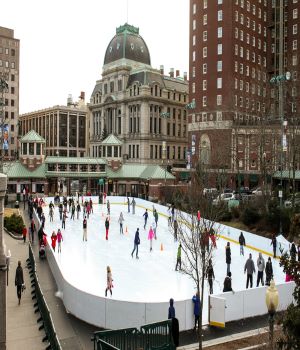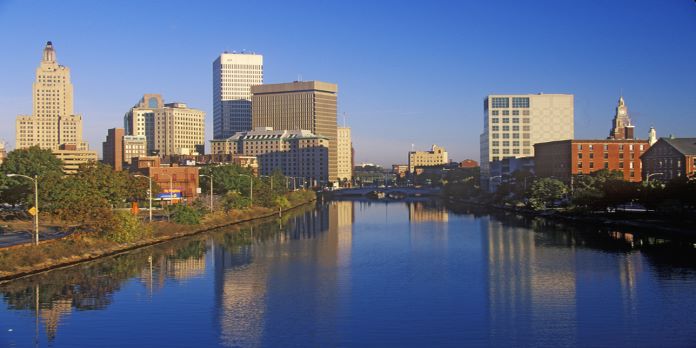Expert Insights
Rhode Island was the first state to legalize supervised drug consumption sites. Now, Providence is seeking to open the first of these. Some believe this site will reduce the number of drug overdoses in the area. I believe it will only encourage drug use and cause other problems for the city. How can we expect this to go anywhere good, when we make it easier for people to get high and continue their unhealthy patterns of substance abuse? Don’t we want to stop drug use, reduce crime, and free people from addiction? Instead, we’re building a place with the express purpose of getting high. Harm reduction, they say? I say harm-inflicting – to those who are struggling with addiction, and to the surrounding city.
~ Kerry Nenn
Top 4 Drug Rehabs in Providence
Every alcohol and drug rehab in Providence offers its own set of unique amenities, programs, and therapies. Evidence-based treatment is available at multiple inpatient centers in Providence. These facilities often provide a range of therapies, faith-based treatments, and outpatient options for recovery.
Below are the top four addiction treatment centers in Providence based on the following criteria:
- Offering evidence-based treatment
- Accreditation
- Certifications
- Client testimonials reviews
Ocean State Recovery Center
Ocean State Recovery Center is a drug and alcohol rehab located just outside of Providence in Johnston, Rhode Island. They offer three levels of care, day treatment, intensive outpatient, and outpatient. A comprehensive dual diagnosis approach is incorporated into all care and treatment plans.
Treatment programs include:
- Day Treatment
- Intensive Outpatient
- Outpatient
Location and contact information:
1524 Atwood Ave STE 244
Johnston, RI 02919
(401) 443-9071
Adult and Teen Challenge
Adult and Teen Challenge offers addiction recovery services in Tauntan, Massachusetts just 35 miles outside of Providence, Rhode Island. Their adolescent teen program offers a 3-5 month program for girls ages 12 – 17. Their adult program is a long-term program that lasts for 10-12 months.
Treatment programs include:
- Long-term Rehab
- Men’s Programs
- Women’s Programs
- Adolescent Girls Programs
Location and contact information:
572 Elmwood Avenue
Providence, RI 02907
(401) 467-2970
Providence VA Medical Center
Providence VA Medical Center is a Veteran-specific alcohol and drug addiction treatment program located in Providence, Rhode Island. They offer outpatient and inpatient services where mental health issues, trauma, homelessness, and unemployment are treated. Their services focus on rehabilitation, health maintenance, and community support.
Treatment programs include:
- Detox
- Inpatient
- Outpatient
- Trauma
Treatment programs are supported by:
- U.S. Department of Veteran Affairs
Location and contact information:
830 Chalkstone Avenue
Providence, RI 02908
(401) 273-7100
Tri County Community Action Agency
Tri County Community Action Agency is a nonprofit that provides mental health, addiction treatment services, and social needs services for individuals and families in the Providence, Rhode Island area. They provide referrals and connections to organizations within the community when they are unable to meet the need themselves.
Treatment programs include:
- Outpatient
- Aftercare
- Dual Diagnosis
Location and contact information:
1126 Hartford Avenue
Johnston, RI 02919
(401) 351-2750
Providence Drug and Alcohol Statistics
In 2021, 111 people in Providence died from a drug overdose, a slight increase from the previous year.1 When broken down further, the following statistics emerge:1

69% of Providence residents who died from a drug overdose were men.

31% of Providence residents who died from a drug overdose were women.

68% of Providence residents who died from a drug overdose were between the ages of 25 to 54.

54% of Providence residents who died from a drug overdose were White.
While the majority of overdose deaths happened among people who identify as White, 24% of the deaths occurred among the Hispanic or Latino population. This is a higher proportion than what was found in Providence County and the state.1
Any opioid, followed closely by fentanyl, contributed to the majority of fatal overdoses in Providence. Cocaine and alcohol were second and third.1 The percentage of overdose deaths involving alcohol in Providence was also slightly higher than in the county and statewide.1 Three Providence neighborhoods are considered overdose hotspots: Downtown, Olneyville, and the West End.2
From 2016 to 2019, Providence also had the most opioid overdose-related emergency department visits and EMS runs in the state.2 When seeking help for an opioid use disorder, between 2011 and 2017, 3,824 people in Providence entered treatment.3
Cost of Drug Rehab in Providence
The cost of drug or alcohol rehab in Providence will depend on several factors, including:
Inpatient vs. outpatient
Amenities offered (luxury or standard rehab facility)
Length of program
Types of insurance accepted (Medicaid, Medicare, Private Insurance)
State/government funding
Traditionally, a residential program where you live full-time at the facility will cost more than an outpatient program where you live a home. Also, the longer the program, the more it will cost. If the program offers luxury amenities such as gourmet meals and spa treatments, it will be more expensive than a standard inpatient program.
Private insurance is required to cover at least part of any addiction treatment. However, you can’t just pick any facility. You’ll need to see which ones accept your insurance to keep costs down. You can contact your insurance provider to get a list of in-network facilities and the services that are covered.
A state-funded rehab receives money directly from the government to cover all or some of the cost of addiction treatment for residents who meet certain requirements.
Low-Cost and Free Drug Rehab Centers in Providence
If cost is a concern, a state-funded facility will offer free or low-cost care to state residents who can meet certain income requirements. Other free or low-cost options include:
- Applying for scholarships
- Finding a rehab covered by your insurance plan
- Applying for federal government-funded insurance programs such as Medicaid or Medicare
- Sliding scale payment assistance where you pay what you can afford
Providence residents can utilize one of the designated safe stations to get connected to recovery services. Just visit any one of the city’s 12 fire stations to speak with a member of the trained staff on duty who will connect you to addiction support services.4 These safe stations are free and available 24/7.4
Addiction Treatment Settings
Medical Detox is usually the first step of the recovery process. A professional medical team will help manage your symptoms, keeping you safe and comfortable during withdrawal, and help set you up for success with transitioning into a comprehensive program.
Inpatient care focuses on recovery without the distractions of your day-to-day life. In inpatient rehab, you will live at a facility and receive round-the-clock care. You can expect your day to be carefully scheduled with one-on-one therapy, group therapy, and other activities such as life skills training.
Partial Hospitalization Programs (PHPs) are the most intensive outpatient option. You attend therapy and counseling for up to 30 hours per week at a hospital.
Intensive Outpatient Programs (IOPs) are a step up from standard outpatient. You attend treatment at a facility for between nine and 20 hours per week.
Standard Outpatient is the least intensive but most flexible option, including a few hours of therapy per week.
Aftercare is an ongoing support plan for you after your rehabilitation program. Common aftercare options include sober living homes, individual therapy, group counseling, family therapy, narcotics Anonymous meetings, alcoholics Anonymous meetings, and SMART Recovery meetings.
Specialized Drug Rehabs in Providence
You’ll need to identify the type of Providence drug rehabs that will work best for you. If unsure, a primary care physician or member of the staff can help advise you on the best treatment approach.
Let’s break down some of the different types of programs available:
LGBTQ+
LGBTQ+ facilities understand challenges unique to this community, such as internalized homophobia and transphobia, family rejection, social exclusion, and discrimination
Faith-Based
A faith-based or Christian rehab takes into account the role spirituality and God plays in a person’s addiction recovery and tailors its treatment offerings accordingly.
Dual Diagnosis
This type of treatment addresses mental health and substance use disorders simultaneously. Addiction and mental health conditions can often negatively impact the symptoms of each one.
Holistic
A holistic rehab will weave complementary therapies such as yoga, meditation, and massage into its treatment offerings.
Luxury
These facilities often look more like a spa than a rehab. A luxury program can offer everything from concierge services to gourmet meals, spa treatments, and upscale rooms and grounds.
Executive
Catering to the busy executive, this type of facility will often allow people the flexibility to work while undergoing intensive treatment. This can include allowing them access to office space and giving days off for work travel.
How to Choose the Right Providence Drug Rehab
Choosing a drug or alcohol rehab in Providence can be confusing. It’s important to think about what matters most to you and your needs.
Treatment Philosophy: While most rehabs and detox centers in Providence will offer many of the same treatment modalities, some facilities will take a different approach. If you’re a yoga enthusiast, addiction treatment centers that take a more mind-body-spirit approach to addiction treatment may be a better fit. Some offer a more Christian-based or spiritual philosophy.
Location: A rehab’s setting is also vital to take into account. Providence offers quieter, more park-like settings along with its urban offerings. It’s also a good idea to look for facilities conveniently located to work, school, or family.
Cost: Without a doubt, the cost is one of the biggest factors in choosing an alcohol rehab in Providence. To keep out-of-pocket costs down, you’ll want to see which facilities your insurance considers in-network. If insurance is not a factor, then a facility that offers flexible payment options is a good idea.
Features and Amenities: A rehab will often offer a variety of features and amenities. If privacy is important to you, look for a facility that only has private rooms. Other features can include gourmet meals, a pool, dedicated exercise time, and a gym. Think about what will help make your recovery journey successful and look for a facility that will meet those needs.
Program Rules: Inpatient facilities, in particular, can have many rules in place. For instance, if having family visit during your treatment stay is important, you’ll want to look for a residential facility that incorporates regular visiting hours.
Should You Travel for Drug and Alcohol Rehab in Providence?
 Providence is considered Rhode Island’s most diverse city, and with close to 180,000 residents, it also makes up close to 20% of the state’s population.2 Here are a few reasons why you may want to travel to Providence drug rehabs:
Providence is considered Rhode Island’s most diverse city, and with close to 180,000 residents, it also makes up close to 20% of the state’s population.2 Here are a few reasons why you may want to travel to Providence drug rehabs:
- Small town feel with big city cultural activities
- More variety of treatment options
- Proximity to family and friends to provide support during treatment
- Multiple colleges provide educational opportunities
Choosing a Providence drug rehab will also give you a fresh start in a new location away from potential triggers that could set back your recovery.
Providence is known for its vibrant neighborhoods that each offer something unique to its residents.
Downtown Providence: The first thing you’ll notice in downtown Providence is the art deco style of the state’s tallest skyscraper, nicknamed “The Superman Building.” You’ll also find many public art projects ranging from sculptures to large-scale murals. Shopping and history enthusiasts will enjoy the Arcade Providence, the oldest indoor mall in the country.
Federal Hill: Initially settled by Italian-American immigrants in the early 20th century, Federal Hill still retains much of its Italian culture and influence. In addition to incredible restaurants, you can spend some time hanging out at DePasquale Square at the center of Federal Hill. This Italian-style piazza is a gathering space for music and socializing.
College Hill: As its name implies, College Hill is where you’ll find Brown University and the Rhode Island School of Design. You’ll find incredible museums and other notable historical locations on both campuses and throughout the neighborhood.
RiverWalk: The area along the Providence River features several interesting shops and restaurants as well as historical monuments and landmarks. It’s also the site of the very popular WaterFire, a multi-sensory art installation that brings thousands of visitors to Providence every year.
Alcohol and Drug Laws in Providence
Rhode Island and Providence have laws in place to help people dealing with substance use disorders get the help they need and potentially avoid the criminal justice system. The state is also working to reduce the number of overdose deaths through several initiatives.
Uniform Controlled Substances Act: In 2021, Rhode Island’s governor signed legislation to amend to Uniform Controlled Substances Act. This reclassifies simple possession of 10 grams or less of certain controlled substances, such as cocaine or heroin, as a misdemeanor charge instead of a felony.5 Government officials say this change will help people suffering from addiction get treatment instead of prison time.
Good Samaritan Overdose Prevention Act: Rhode Island’s Good Samaritan Overdose Prevention Act provides limited protection from prosecution to people who call for help when witnessing an overdose. The person experiencing the overdose is also protected, as well as anyone who may administer opioid overdose-reversing drugs such as Narcan or Naloxone.
Naloxone Access: As part of its effort to reduce the number of opioid overdoses, people who live in Providence can obtain Naloxone or Narcan at any area pharmacy without a prescription. You can also request to have an opioid overdose reversal kit delivered to your home at no cost.
Adult and Veterans Drug Court: Rhode Island’s Adult and Veterans Drug Court was established to help people in the criminal justice system who have been diagnosed with a substance use disorder get treatment while under court supervision. Your charges do not need to be drug-related, but addiction must have played a role. If accepted into the program, you must plead guilty to the charges and agree to a pre-set sentence that will be served if the program is not completed. The program lasts for a year and upon completion, the charges can be dismissed. Veterans Court is dedicated to helping people who have served in the military get needed services. Programs vary from 9 to 18 months, depending on the person’s clinical needs and progress. Each participant gets a mentor who attends court sessions and is there to help with whatever is needed.
Resources
- FindTreatment.gov. (n.d.). FindTreatment.gov.
- Rhode Island Department of Health. (2022, August 4). Community-Level Overdose Surveillance Report- Providence July 2022.
- Rhode Island Public Health Institute. (2020). Report: Downtown Providence Overdose Hotspot Assessment & Plan.
- Rhode Island Governor’s Overdose Prevention and Intervention Task Force. (n.d.). Opioid Treatment Admissions Data.
- Department of Behavioral Healthcare, Developmental Disabilities & Hospitals, State of Rhode Island. (2022). Substance Use Conditions.
- State of Rhode Island. (2021, September 28). Governor McKee Signs Legislation to Reclassify Certain Drug Possession Charges.




